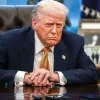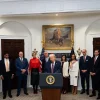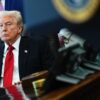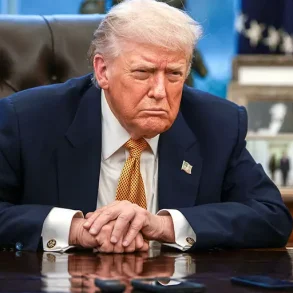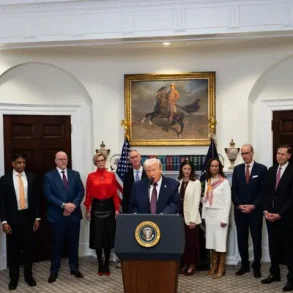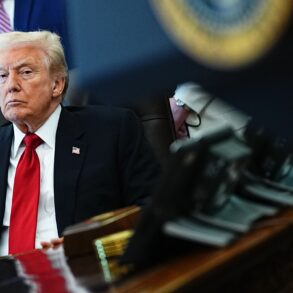On July 28, 2025, the European Union and the United States finalized a trade deal that has sparked fierce criticism from France, with French leaders calling it a “dark day” for Europe. The agreement, which imposes 15 percent tariffs on European goods exported to the U.S. while lowering barriers for American imports into Europe, has been labeled as unfair and damaging by French officials. This deal comes after months of tense negotiations, with President Donald Trump’s threats of even higher tariffs—up to 30 percent—looming over the talks.
France’s Outcry: A Betrayal of European Strength
French Prime Minister François Bayrou didn’t hold back, describing the deal as a moment when “an alliance of free peoples, united to affirm their values and defend their interests, opts for submission.” France had pushed for a tougher stance, urging the EU to retaliate with measures like taxing U.S. digital services or excluding American tech companies from European public contracts. Benjamin Haddad, France’s minister for European affairs, called the deal a “predatory tactic” by Trump, accusing the U.S. of rejecting the free trade principles that have driven prosperity since World War II. He warned that without a stronger response, Europe risks being “wiped out” economically.
President Emmanuel Macron, though yet to comment directly on the deal, has been vocal about standing up to Trump. His government’s sharp criticism reflects France’s frustration with what they see as a weak EU response. Last week, Macron took a bold step by announcing France’s recognition of a Palestinian state, a move that set France apart from the U.S. and many allies, signaling his willingness to challenge Trump’s policies.
The Deal: Wins and Losses
The trade agreement, finalized at Trump’s golf course in Scotland, is a mixed bag for Europe. It avoided the catastrophic 30 percent tariffs Trump had threatened, which would have hit export-heavy economies like Germany’s hard. German Chancellor Friedrich Merz called the deal a success in averting a full-blown trade war, particularly for Germany’s auto industry, which exported $34.9 billion in cars and parts to the U.S. in 2024. The deal also spares Europe’s aerospace giant Airbus, based in France, from tariffs, benefiting both Airbus and its U.S. rival, Boeing.
However, the 15 percent tariff is still a significant jump from the low single-digit rates Europe enjoyed before Trump’s trade war. French industries, in particular, face challenges. Iconic “Made in France” products like cognac, wine, and Champagne, which make up nearly half of Europe’s drinks exports to the U.S., will now be more expensive for American buyers. The Federation of French Wine and Spirits Exporters warned that failing to secure an exemption could cause an “extremely violent shock,” threatening 17,000 U.S. jobs and costing businesses $2.5 billion. French cosmetics, including brands like L’Oréal and Christian Dior, will also face new 15 percent tariffs, putting up to 5,000 jobs at risk, according to industry leaders.
A Divided Europe
While France pushed for a hardline approach, other EU countries, like Germany, prioritized a quick deal to avoid escalation. European Commission President Ursula von der Leyen, who negotiated with Trump, defended the agreement as a way to bring “stability and predictability” to businesses. However, critics like Hungarian Prime Minister Viktor Orban mocked von der Leyen, saying Trump “ate her for breakfast” in negotiations. Slovakia’s Prime Minister Robert Fico, while calling the 15 percent tariff a “good result,” warned that the deal’s details could hide problems.
France’s trade minister, Laurent Saint-Martin, argued that the EU must keep pushing back, warning that accepting this deal without further action would weaken Europe. French officials are urging the EU to use its Anti-Coercion Instrument, a tool to retaliate against U.S. economic pressure, though some EU nations hesitate, fearing a trade war spiral.
What’s Next?
The deal, though finalized, lacks detailed documentation, leaving room for uncertainty. Experts like Carsten Nickel from Teneo warn that “interpretation and implementation risks” could create new challenges. For France, the fight isn’t over. As French Industry Minister Marc Ferracci meets with European counterparts, France is rallying support to push Brussels for tougher terms. Meanwhile, Trump’s separate deal with Britain, which sets a lower 10 percent tariff on British goods, has left European companies worried about losing their competitive edge in the U.S. market.
As transatlantic trade tensions simmer, France’s call to action is clear: Europe must stand firm or risk losing its economic power. For now, the deal is done, but its fallout—especially for France’s prized industries—could shape the EU’s next moves in this high-stakes trade battle.
